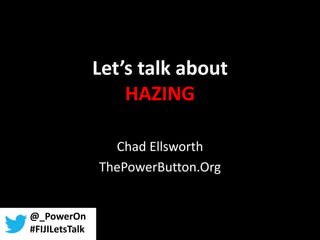Lets talk about hazing
- 1. Letâs talk about HAZING Chad Ellsworth ThePowerButton.Org @_PowerOn #FIJILetsTalk
- 5. To understand hazing, we have to understand brotherhood.
- 8. Defining Brotherhood âĒ Gang Mentality âĒ Shared Social Experiences âĒ Common Interests âĒ Accountability to Shared Values Adapted from https://www.phideltatheta.org/2012/09/want-to-fix-a-hazing-problem-in-your-chapter-start-by-fixing-your-brotherhood-problem/
- 15. WHAT is hazing?
- 16. Hazing is enduring âĒ 387 B.C. - Earliest account of hazing-like behaviors âĒ 371 A.D. - âThe Overturnersâ âĒ 1340 - University of Paris forbade hazing under penalty of expulsion âĒ 1657 - First documented incident in U.S. âĒ 1838 - First documented death in U.S. Nuwer, H. (2004). The Hazing Reader. Bloomington: Indiana University Press.
- 17. Hazing is persistent âĒ National Study of Student Hazing â 11,482 students â 53 colleges and universities â 47% of students come to college having experienced hazing. â 55% of college students experience hazing Allan, E.J. & Madden, M. (2008, March 11). Hazing in view: College students at risk.
- 18. Hazing is systemic âĒ Stanford Prison Experiment (1971) â Ordinary, normal, healthy young men succumbed to, or were seduced by, inherent social forces âĒ Symbolic Interactionist Theory (1999) â Systematic manipulation of symbols, social relations, and definitions of situations
- 23. HOW do you bring brotherhood to your/your chapterâs life?
- 26. Status Quo Call to Adventure Assistance Departure Trials Approach Crisis Treasure Result Return New Life Resolution The Heroâs Journey
- 30. Challenge the Status Quo. Confront your Fears. Change your World. Chad Ellsworth ThePowerButton.Org/fijiletstalk Password: saintlouis Facebook ThePowerButton Twitter @_PowerOn
Editor's Notes
- #2: DESCRIPTION: Do members of your chapter believe in the benefits of hazing? Do you? Are you aware of the possible consequences? Most chapters and individual members that are caught hazing knew the consequences, but continued to haze in spite of them. Why? Are our members (and prospective members) addicted to hazing? In this session, we will have an honest, open dialogue about the benefits and challenges of hazing, revealing the true nature of hazing, rites of passage, and traditions. Finally, we will discuss how to navigate this thorny issue, and lead your chapter and community. 5/5 Introduction 10/15 Defining Brotherhood   -Gang mentality, Shared social experiences, Common interests, Accountability to shared values (connect to classic or recent movies?) 15/30 Brotherhood Fuel Tank   -How much of each type of brotherhood makes up your chapter? (Actual)   -How much of each type of brotherhood could make up your chapter? (Ideal) 15/45 What is hazing?   -What are the pro's?   -What are the con's? 15/60 What is the effect of hazing on brotherhood?   -How does hazing affect each type of brotherhood?   -If brotherhood is our product, how do we get there? 10/70 Continuum of hazing   -Hazing----------O----------Heroism   -What would it look like to move three, five, seven spaces to the right? 5/75 Closing, Q&A
- #10: Gang mentality âMy brothers support me and âhave my backâ because weâve been through a lot together. They would do anything for me, and I would do anything for them.â
- #11: Shared social experiences âMy brothers and I do almost everything together â they are the people I prefer to spend most of my time with and we always have a blast, whatever weâre doing.â
- #12: Common interests âMy brothers and I are drawn together by our similar beliefs, values and backgrounds. They are my best friends and will be the groomsmen in my wedding.â
- #13: Accountability to shared values âMy brothers help make me a better person by holding me to high standards based on our shared values.â
- #14: Fuel Tank How much of each type makes up your brotherhood? (Actual) How much of each type could make up your brotherhood? (Ideal)
- #18: -55% of college students involved in clubs, teams, and organizations experience hazing. -Hazing occurs in, but extends beyond, varsity athletics and Greek-letter organizations and includes behaviors that are abusive, dangerous, and potentially illegal. -Alcohol consumption, humiliation, isolation, sleep- deprivation, and sex acts are hazing practices common across types of student groups. -There are public aspects to student hazing including: 25% of coaches or organization advisors were aware of the groupâs hazing behaviors; 25% of the behaviors occurred on-campus in a public space; in 25% of hazing experiences, alumni were present; and students talk with peers (48%, 41%) or family (26%) about their hazing experiences. -In more than half of the hazing incidents, a member of the offending group posts pictures on a public web space. -More students perceive positive rather than negative outcomes of hazing. -In 95% of the cases where students identified their experience as hazing, they did not report the events to campus officials. -Students recognize hazing as part of the campus culture; 69% of students who belonged to a student activity reported they were aware of hazing activities occurring in student organizations other than their own. -Students report limited exposure to hazing prevention efforts that extend beyond a âhazing is not toleratedâ approach. -47% of students come to college having experienced hazing. -Nine out of ten students who have experienced hazing behavior in college do not consider themselves to have been hazed.
- #22: 1/2 room âproâ (groups of 2-3) 1/2 room âconâ (groups of 2-3)






























